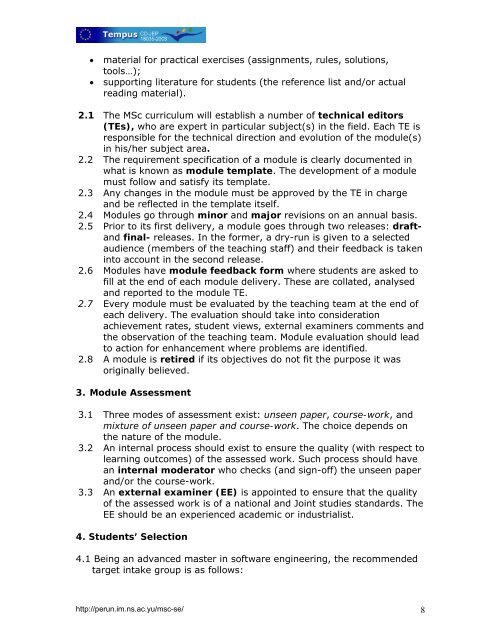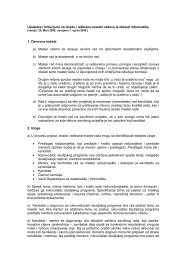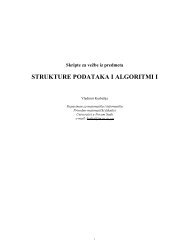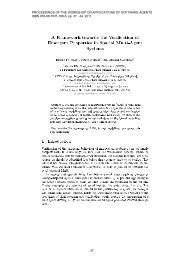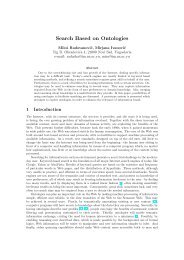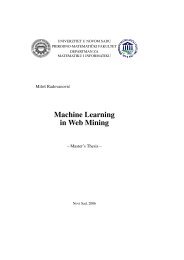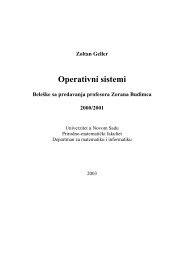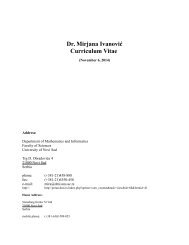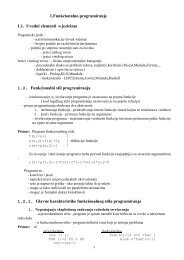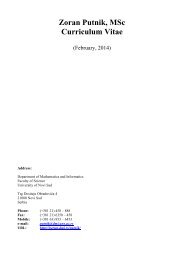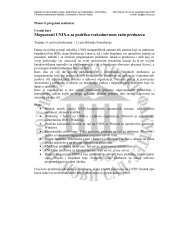Full document describing all aspects of the curriculum, release 2 (pdf)
Full document describing all aspects of the curriculum, release 2 (pdf)
Full document describing all aspects of the curriculum, release 2 (pdf)
Create successful ePaper yourself
Turn your PDF publications into a flip-book with our unique Google optimized e-Paper software.
• material for practical exercises (assignments, rules, solutions,tools…);• supporting literature for students (<strong>the</strong> reference list and/or actualreading material).2.1 The MSc <strong>curriculum</strong> will establish a number <strong>of</strong> technical editors(TEs), who are expert in particular subject(s) in <strong>the</strong> field. Each TE isresponsible for <strong>the</strong> technical direction and evolution <strong>of</strong> <strong>the</strong> module(s)in his/her subject area.2.2 The requirement specification <strong>of</strong> a module is clearly <strong>document</strong>ed inwhat is known as module template. The development <strong>of</strong> a modulemust follow and satisfy its template.2.3 Any changes in <strong>the</strong> module must be approved by <strong>the</strong> TE in chargeand be reflected in <strong>the</strong> template itself.2.4 Modules go through minor and major revisions on an annual basis.2.5 Prior to its first delivery, a module goes through two <strong>release</strong>s: draftandfinal- <strong>release</strong>s. In <strong>the</strong> former, a dry-run is given to a selectedaudience (members <strong>of</strong> <strong>the</strong> teaching staff) and <strong>the</strong>ir feedback is takeninto account in <strong>the</strong> second <strong>release</strong>.2.6 Modules have module feedback form where students are asked t<strong>of</strong>ill at <strong>the</strong> end <strong>of</strong> each module delivery. These are collated, analysedand reported to <strong>the</strong> module TE.2.7 Every module must be evaluated by <strong>the</strong> teaching team at <strong>the</strong> end <strong>of</strong>each delivery. The evaluation should take into considerationachievement rates, student views, external examiners comments and<strong>the</strong> observation <strong>of</strong> <strong>the</strong> teaching team. Module evaluation should leadto action for enhancement where problems are identified.2.8 A module is retired if its objectives do not fit <strong>the</strong> purpose it wasorigin<strong>all</strong>y believed.3. Module Assessment3.1 Three modes <strong>of</strong> assessment exist: unseen paper, course-work, andmixture <strong>of</strong> unseen paper and course-work. The choice depends on<strong>the</strong> nature <strong>of</strong> <strong>the</strong> module.3.2 An internal process should exist to ensure <strong>the</strong> quality (with respect tolearning outcomes) <strong>of</strong> <strong>the</strong> assessed work. Such process should havean internal moderator who checks (and sign-<strong>of</strong>f) <strong>the</strong> unseen paperand/or <strong>the</strong> course-work.3.3 An external examiner (EE) is appointed to ensure that <strong>the</strong> quality<strong>of</strong> <strong>the</strong> assessed work is <strong>of</strong> a national and Joint studies standards. TheEE should be an experienced academic or industrialist.4. Students’ Selection4.1 Being an advanced master in s<strong>of</strong>tware engineering, <strong>the</strong> recommendedtarget intake group is as follows:http://perun.im.ns.ac.yu/msc-se/ 8


